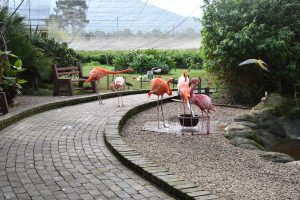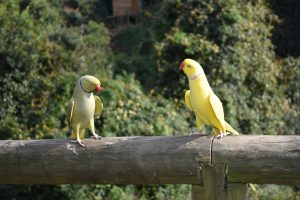News
» Go to news mainAggies in Africa 2019!

Last week the third contingent of students from ║┌┴Ž│į╣Ž═° began their journey to the Eastern Cape of South Africa to participate in the highly anticipated African Wildlife Ecology (AWE) course, a three-week intensive credit course introduced as part of the Bioveterinary Science program.
ŌĆ£This course was developed for our degree in Bioveterinary Sciences, but more importantly it was developed because there is no better place to see and study ecology than in Africa,ŌĆØ says Dr. David Gray, Dean of the Faculty of Agriculture. ŌĆ£Large predators, interaction between species, game migrations ŌĆō the African bush has it all.ŌĆØ
AWE was developed in collaboration with Dr. Dan Parker and in partnership with the Wildlife & Reserve Management Research Group at Rhodes University, who also help to deliver course content.╠² Students from across disciplines ŌĆō and the largest group to date ŌĆōare accompanied by Dr. Janine Gray and Sarah Gatti-Yorke, instructors in the Department of Animal Science and Aquaculture.
ŌĆ£This is the third co-hort of students I am taking to South Africa and it never gets old,ŌĆØ said Dr. Janine Gray.╠² ŌĆ£There is so much to experience in Africa that each trip is different and I love showing the students my home country and what I studied when doing my degree,ŌĆØ she added.╠² ŌĆ£There is no better place to study ecology than Africa due to its diverse wildlife and anyone who visits Africa canŌĆÖt fail to realise that itŌĆÖs a place where nature is still in charge.ŌĆØ
Bailey Tarrant, entering her final year of an Animal Science honours program in the fall decided she wanted to take part in the AWE course because it is a unique opportunity she felt she couldnŌĆÖt pass up.
ŌĆ£I am passionate about animal science and have been very privileged to expand my knowledge extensively throughout the course of my degree, however, getting the chance to travel to South Africa and gain first-hand experience and knowledge about what I have touched on in classes and through my own research is what drew me to the course,ŌĆØ she explained.╠² ŌĆ£I also believe that this experience will be valuable in my future career as I plan on furthering my education, upon completion of my undergraduate degree, in the field of veterinary medicine.ŌĆØ
The course, which incorporates field research, lectures and practice in conservation and veterinary care also involves students completing an individual research project on an area of interest.
ŌĆ£I havenŌĆÖt decided upon the topic of my individual research project yet, once I arrive in South Africa I hope to find something that draws my interest and build a project from there! However, IŌĆÖm very interested in animal behaviour so I think it will surround that topic,ŌĆØ said Bailey.
 The students will spend most of their time at Amakhala Game Reserve, a privately-owned park sprawling over 18,000 acres that was once agricultural land.╠² The group will also be spending time at Storms River Mouth, a marine coastal ecology reserve; Addo Elephant Park and as a special surprise are going to Monkeyland, a multi-species primate sanctuary, Birds of Eden, home to 280 species of African birds and Jukani, an ŌĆśapex predatorŌĆÖ sanctuary, in Plettenberg Bay.
The students will spend most of their time at Amakhala Game Reserve, a privately-owned park sprawling over 18,000 acres that was once agricultural land.╠² The group will also be spending time at Storms River Mouth, a marine coastal ecology reserve; Addo Elephant Park and as a special surprise are going to Monkeyland, a multi-species primate sanctuary, Birds of Eden, home to 280 species of African birds and Jukani, an ŌĆśapex predatorŌĆÖ sanctuary, in Plettenberg Bay.
 While South African wildlife is certainly a highlight of the trip its not all the students will experience.╠² They will be involved with children from local schools planning and running different activities for World Environment Day.
While South African wildlife is certainly a highlight of the trip its not all the students will experience.╠² They will be involved with children from local schools planning and running different activities for World Environment Day.
ŌĆ£I hope to take in as much as possible while IŌĆÖm there! I would really like to be able to see a big portion, if not all, of the animals weŌĆÖve been learning about in preparation for the trip. IŌĆÖm also hoping to be able to explore South Africa as much as possible and to learn more about the history and culture while IŌĆÖm there,ŌĆØ said Bailey.
To follow along on their adventure, you can find their blog at ╠²
╠²
Recent News
- Holiday Hours
- From Academia to Agriculture: Former PhD student and supervisor launch innovative vertical farming venture
- Community Representative ŌĆæ Animal Care and Use
- New Face on Campus
- Sowing Seeds of Knowledge: A GardenerŌĆÖs Journey with DeAnne Pelchat
- ║┌┴Ž│į╣Ž═°Advising Summit
- Legacy Awards 2024
- Regenerative Agrourbanism
